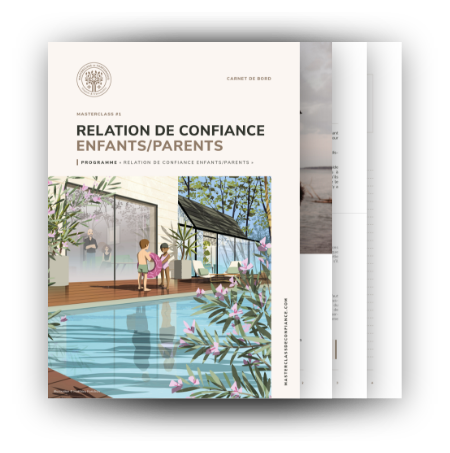masterclass
Parent-child
trust relationship
trust relationship
WITH Laurent combalbert
LIKE A MUSCLE, CONFIDENCE NEEDS TO BE WORKED EVERY DAY.
GRATUIT
Including all masterclasses, logbooks and IPC test©.
4,7/5
12 lessons
in vidéo (2h06)
There’s no such thing as a parenting school. No evening classes, no manuals handed down from generation to generation. We have to experiment with our own powers, which are not magic, but which enable us to find the alchemy best suited to our children’s upbringing, while leaving them the room for maneuver essential to their development.
In this Masterclass, you’ll learn how to :
- Manage conflict more effectively.
- Understand and manage your children’s emotions.
- Set limits that can change over time.
- Pass on to your children the foundations of trust.
the content
logbook

You’ll find the content of each lesson as well as exercises and a bibliography for further reading, available to download in pdf format.
FULL Program
12 LEssONS
2H02 MASTERCLASS
1/ Should we negotiate with our children?
Negotiation is one of the educational methods used to build children and future adults. In this lesson, we’ll see that negotiating doesn’t mean giving in, but rather finding an agreement in a situation of expressed disagreement.
07:27
2/ Choose conflict, not confrontation
The word “conflict” often has a negative connotation, but conflict can create added value when rules are established in advance. In this lesson, we’ll look at the pitfalls to be avoided if you don’t want to tip over into confrontation.
07:19
3/ The negotiable and non-negotiable
In the context of parent/child negotiation, we need to define the negotiable, non-negotiable and never-negotiable framework. We’ll see that it’s sometimes possible to compromise on form rather than substance, to give our children room to maneuver.
07:23
4/ The players in the parent-child relationship
In addition to parents, there are many other players in the parent/child negotiation process, such as grandparents, classmates and in-laws. In this lesson, we’ll look at the role of each player and their influence in achieving a common goal.
08:10
5/ Hold the “no”!
As parents, “no” is not an easy position to hold. We’ll see how to establish our legitimacy by clearly setting limits and, above all, maintaining them over time.
05:32
6/ When should you give in?
The exchange of concessions and quid pro quos between the two parties is the very essence of negotiation. The myth of “no compromise” is not the way to enter into negotiations. In this lesson, we’ll look at concessions, quid pro quos and the principle of resistance.
07:48
7/ The alchemy between affect and emotion
The subtle alchemy between affect, affection and emotions makes parent/child negotiations delicate moments, during which it’s not easy to find the right balance. Here, we’ll take a closer look at how to control our emotional involvement.
05:08
8/ Give the gift of thrust.
Many mistakes in negotiation stem from poorly created relationships. Trust is never a given, even with our children. In this lesson, we’ll look at how to generate lasting trust, enabling our children to raise their confidence index.
08:49
9/ Practicing committed listening
Listening is particularly difficult, and far more difficult than you might imagine. Engaged listening requires good preparation and regular practice. In this lesson, we’ll learn how to listen to our children to understand, not to respond.
11:06
10/ When aggressiveness takes over
In the parent/child relationship, the notion of aggression is a special one, as it is always difficult to manage and will impact on the quality of the relationship. Limits must therefore be set quickly. We will distinguish three situations in which action can be taken to neutralize aggression.
08:32
11/ Dealing with lies and bad faith
As in everyday life, our children can lie to us, and we can feel betrayed. In this lesson, we’ll develop techniques for dealing with bad faith.
06:33
12/ Our shared common objective: making free and happy children
To educate is to give knowledge, to enable our children to grow up by providing them with both know-how and interpersonal skills. In an uncertain world, these skills will enable them to grow up facing complexity.
06:13
HIGHLIGHTS
12 LESSONS FOR GETTING TO KNOW YOURSELF
- Exclusive, never-before-seen videos on the subjects of trust, negotiation and leadership.
- Exceptional experts, recognized for their skills in the field and their ability to pass on lessons learned from their operational experience.
- Concrete examples and debriefings of real-life cases to support the theoretical input essential for assimilating the concepts covered.
- An exclusive logbook for each Masterclass, containing key definitions, concepts covered and a bibliography dedicated to each theme.
- 12 video lessons per Masterclass, so you can watch and review them whenever and wherever you like, at your own pace.
- Inspiring experts who put themselves within everyone's reach, so that everyone can, at their own pace, become the person, the negotiator, the trusted leader.
- An intimate atmosphere and a sharing of stories and experiences from the field to illustrate the fundamental concepts of trust, negotiation and leadership.
- A notebook of exercises and personal questions to record your own ideas and experiences, so that each Masterclass is your own.
The other masterclasses
BECOME THE PERSON YOU TRUST



